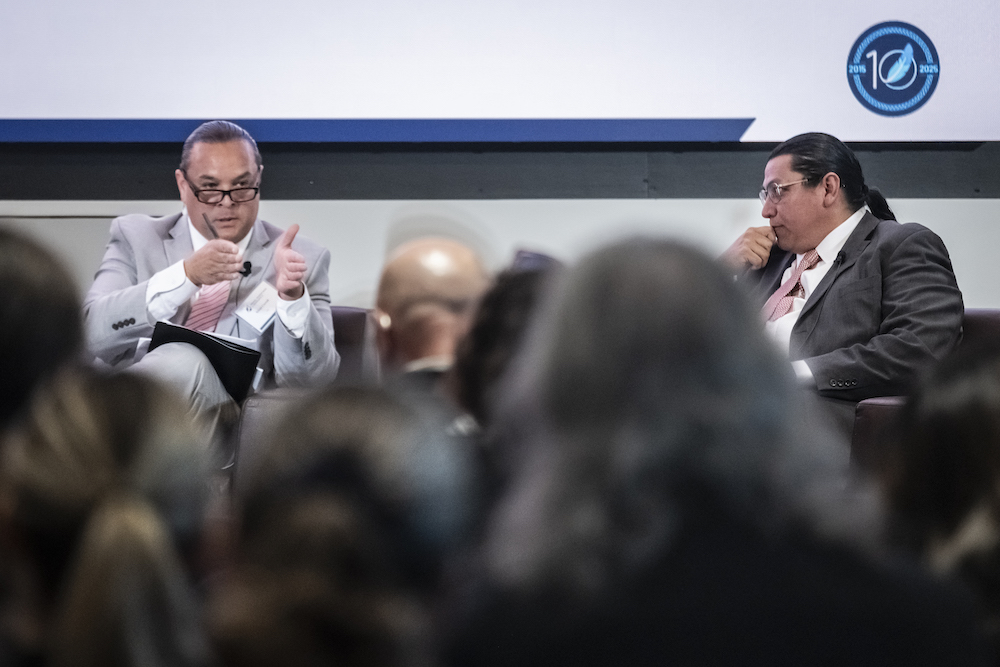
- Details
- By Brian Edwards
- Economic Development
MINNEAPOLIS — The Federal Reserve Bank of Minneapolis formally launched its Survey of Native Nations to all federally recognized tribes Thursday, expanding a data collection effort that tribal leaders say addresses critical gaps in economic information about Indian Country.
The announcement came during a panel discussion at the 10th anniversary event and annual data summit for the Center for Indian Country Development, the Federal Reserve's research and policy institute focused on tribal economies.
“Without this data, it literally would cost us hundreds of millions of dollars,” said Chairman Gerald Gray of the Little Shell Tribe of Montana, which participated in the two pilot phases of the survey. “We use it for a whole variety of things. When you're talking about local economies, state economies, federal — everything we do is reliant on data.”
The Center for Indian Country Development spent more than two years developing the survey's infrastructure and tribal governments in Montana in summer 2023, then expanded to tribes in the Pacific Northwest and along the East Coast in 2024. The pilot phases collected fiscal year 2022 data. The effort stems from the center's data initiative, announced three years ago, which committed to making economic data about Indian Country more accessible to tribal governments.
Phil Gover, senior project manager at the center and one of the project leads, said public data sources often fail to adequately capture tribal economies. Geography-based datasets rarely consider tribal geographies in their design, and data masking techniques used to protect anonymity can make information about smaller communities inaccurate or absent entirely.
The survey addresses these limitations while prioritizing tribal data sovereignty. Tribes maintain ownership of their data and control how the Federal Reserve uses it through data use agreements. The survey's flexible design allows tribes to choose which questions to answer and what type of data to share, with estimates and ranges acceptable.
“In an era of federal funding uncertainty, understanding how federal transfers flow through the public economy at the local level can help tribes plan and advocate for themselves,” Gover said. “This data can contextualize how tribal governments impact the local economy and deliver programs and services, as well as showing tribes gaps in the local public service provision.”
Building trust with tribal governments was essential to the survey’s development, according to tribal leaders who participated in the pilot phases.
“Data gathering efforts in Indian Country haven't always been performed in good faith and have even been used to harm our communities,” said Amber Schultz-Oliver, executive director of the Affiliated Tribes of Northwest Indians. “That's why I really appreciate CICD's approach to this project — taking a sort of a slow build and really patience working on trying to identify those metrics that are going to be most impactful and most useful to tribes.”
The center worked with the Affiliated Tribes of Northwest Indians and the United South and Eastern Tribes to expand the survey to their member tribes during the second pilot phase. Eleven tribes from nine states participated in that phase, which ran from September 2024 through April 2025.
The reports tribes receive include three sections: a profile using public data about the tribe's geography and demographics; comparisons between the tribe's fiscal data and local county or municipal governments; and anonymized, aggregated data from other participating tribes that can be compared to the tribe’s data response.
Kitcki Carroll, executive director of United South and Eastern Tribes, said the survey supports tribal decision-making rather than just grant justification. “This is a survey of nations, of government structures, not clubs,” Carroll said. The data conversation, he said, should be about tribal decision makers, elected officials and tribes' governance structures having “the data to make decisions that are about their community, their nations. That's what sovereignty is about, making those decisions that are best for our people … not satisfying some sort of artificial need justification measure in order for a promise to be fulfilled.”
Chairman Gray noted the survey's particular value for the Little Shell Tribe, which gained federal recognition in December 2019. The tribe participated in both survey pilots, providing a baseline comparison of its economy before and after federal recognition, including the period when it received pandemic relief funding.
Tribes interested in participating in the survey can contact the Center for Indian Country Development through its website. Participation requires approval from tribal leadership and coordination with tribal finance staff to complete the survey submission. There is no cost to participate beyond staff time needed to compile the response.
